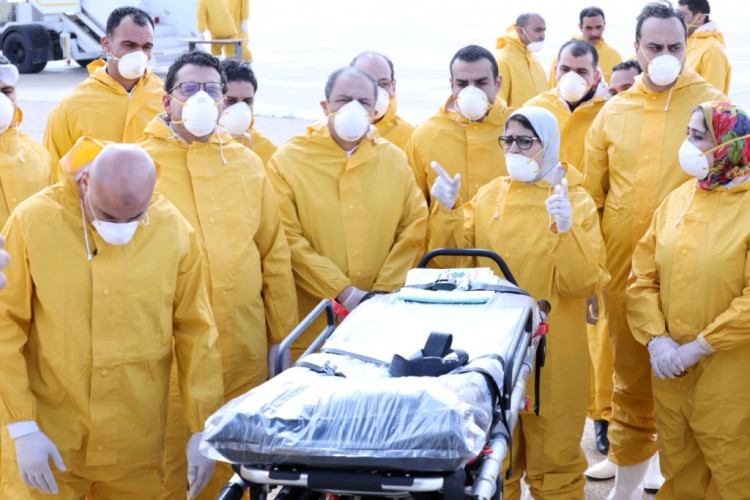Good news in the fight against the rampaging Novel coronavirus (2019-nCoV) outbreak afflicting China, and which has also spread to 25 countries and territories worldwide since December 2019.
Update: Is The Coronavirus Slowing Down In China? Timeline Of Its Battle And Measures Against COVID-19
On Friday, the World Health Organization (WHO) said the coronavirus' rate of infection appears to be slowing down. Friday also marks the second day of human trials using an American-made drug shown in laboratory trials to be "highly effective" in curing 2019-nCoV. The drug is called "remdesivir" and it was developed years ago by the American biotechnology company, Gilead Sciences.
WHO on Friday revealed the number of confirmed cases arising from the pneumonia-like Novel coronavirus (2019-nCoV) has slowed down in China for the second straight day. While this is welcome news, WHO said it's still too early to celebrate.
Dr Tedros Adhanom Ghebreyesus, WHO director-general, said the slowing rate of new cases is "good news" but cautioned the public the situation might reverse itself.
"The numbers could go up again," he said during a press conference Friday at WHO headquarters in Geneva, Switzerland. "As you know, epi curves can zigzag."
An epi curve (short for epidemic curve) is a visual display tool used by WHO that shows the distribution of cases in a disease outbreak over time.
Dr Tedros noted China had reported 31,211 confirmed cases in China and 637 deaths as of Friday morning. On Wednesday, he said the number of confirmed cases grew by more than 3,100 over the previous 24 hours. Dr Tedros described this as "the most cases in a single day since the outbreak started" on Dec. 31, 2019.
He pointed out the overwhelming majority of cases are in China. Of the total number of cases, 80% are in Hubei province where the virus was first detected in Wuhan, the provincial capital with a population of 11 million people.
"Our greatest concern is about the potential for spread in other countries with weaker health systems and who lack the capacity to detect and diagnose the virus," he said. "We're only as strong as the weakest link."
Doctors are trying to calculate when the virus will peak, with some saying it might come as early as four weeks. Dr Mike Ryan, executive director of WHO's emergencies program, said it's "too early" to know when the virus will peak. He also said "we need to be very careful on making any predictions."
"There are cycles of transmission, and we may see those cases increase in the coming days, but at least for the moment, things are stable," said Dr Ryan.
Remdesivir, an antiviral drug originally developed by California-based Gilead Sciences as a treatment for Ebola virus disease, "could be an effective treatment for 2019-nCoV and should be formally investigated as a therapeutic agent for the treatment of 2019-nCoV pneumonia," according to a clinical study.
China is rushing remdesivir to human trials on coronavirus patients after the drug showed early signs of being highly effective. Chinese scientists have found a combination of remdesivir and chloroquine (an 80 year-old malaria drug) "highly effective" at thwarting the novel coronavirus in laboratory studies.
Remdesivir has entered clinical trials in Wuhan on patients with the novel coronavirus. Gilead Sciences is shipping enough doses to treat 500 patients and is accelerating production in case the clinical trials prove successful. Remdesivir was previously tested in two trials in China in patients with moderate and severe symptoms of 2019-nCoV, said Merdad Parsey, Gilead's chief medical officer.
The new trials immediately began a day after Chinese researchers recommended remdesivir be assessed in humans as a potential treatment for 2019-nCoV. China's National Medical Products Administration has approved applications by the China-Japan Friendship Hospital and the Chinese Academy of Medical Sciences to conduct trials evaluating remdesivir.
Friendship Hospital involves 761 patients in two trials. One trial will assess 308 with mild or moderate infection; the other will assess 453 severely infected patients. The trials are being conducted at Jinyintan Hospital in Wuhan under Phase III studies that have been officially launched.
"We hope good results will be achieved in the trials," said Sun Yanrong, deputy director of the science and technology ministry's China Biotechnology Development Center.
The two drugs' efficacies on humans require further clinical tests, said the institute. China can manufacture chloroquine and now wants to produce remdesivir.
The findings were published Tuesday in the peer-reviewed scientific journal, Cell Research. In the study, researchers reported, "Our findings reveal that remdesivir and chloroquine are highly effective in the control of 2019-nCoV infection in vitro."
"Since these compounds have been used in human patients with a safety track record and shown to be effective against various ailments, we suggest that they should be assessed in human patients suffering from the novel coronavirus disease."
The results from trials of remdesivir have impressed China so much it quickly applied for a patent to use the drug to treat 2019-nCoV, or the Wuhan coronavirus. China made the patent application on January 21, said a statement on the website of the Wuhan Institute of Virology. The patent application confirms China's view Gilead's therapy is one of the most promising candidates to fight the fast-spreading outbreak.





